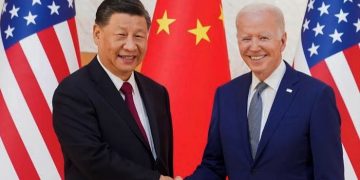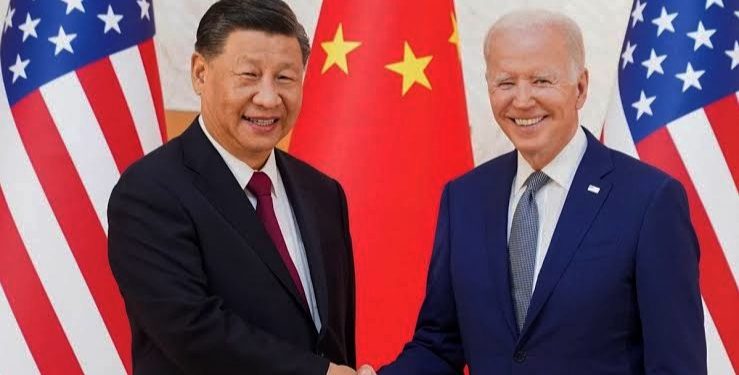By John Ikani
In a significant step towards global security, the United States and China have agreed to keep artificial intelligence away from managing nuclear arsenals.
The pact, announced after a meeting between President Joe Biden and President Xi Jinping at the APEC summit in Lima, Peru, highlights their recognition of the need for human oversight in critical areas of AI development.
Although neither nation was on the brink of deploying AI to make nuclear decisions, this agreement sets a boundary to prevent future risks. National Security Advisor Jake Sullivan emphasized the importance of human control, stating, “It’s an important statement about AI and nuclear doctrine.”
The meeting could be the last between Biden and Xi during Biden’s term, and while they found common ground here, the broader relationship remains tense.
Ongoing Tech and Trade Tensions
Despite this rare accord, the backdrop of U.S.-China relations is marked by fierce disputes over technology and trade. The U.S. has tightened export controls on advanced semiconductors that are crucial for AI, a move seen as an attempt to slow China’s tech progress.
President Xi, in his remarks, underscored that the U.S.-China dynamic has far-reaching implications beyond their borders. “Make the wise choice,” he urged, advocating for a balanced approach to coexistence. His message wasn’t just directed at Biden but also served as a caution to President Donald Trump, whose aggressive trade policies have rattled Beijing.
Trump had threatened to impose tariffs up to 60% on Chinese imports, prompting some American companies to rethink their supply chains. Brands like Steve Madden are already planning to reduce their imports from China, while others, including Nike, are diversifying their sourcing.
Distrust Runs Deep
Trust between the two superpowers remains fragile, especially after recent incidents. Last year, the U.S. shot down a Chinese surveillance balloon that drifted over American territory, symbolizing the deep-seated suspicion. The FBI recently exposed a Chinese cyber campaign targeting U.S. telecom networks to gather intelligence on government officials.
Further complicating matters, U.S. officials have accused China of indirectly supporting Russia’s military operations in Ukraine by providing crucial technology components. Beijing has denied these claims, but Washington remains wary. At the summit, Biden pressed Xi to curtail North Korea’s support for Russia, noting reports of Kim Jong Un sending troops to aid Moscow. Washington sees Beijing as holding the key to restraining Pyongyang, given China’s dominance over North Korean trade.
North Korea’s continued missile tests have heightened concerns, especially its claims of being able to strike the U.S. mainland. The Biden administration is urging China to take a stronger stance against Kim’s provocations, but Beijing has shown little inclination to pressure its ally.
A Complicated Partnership
Biden and Xi share a long history, having first met over a decade ago as vice presidents. Biden often speaks of their relationship as candid and straightforward. However, the last few years have severely tested this dynamic, with clashes over trade, technology, and the sensitive issue of Taiwan.
Reflecting on their years of engagement, Biden acknowledged, “We’ve spent a long time dealing with these issues.” The APEC summit was an attempt to ease tensions, symbolized by their joint appearance wearing traditional Peruvian vicuña wool scarves, nodding to the host nation’s culture.
Taiwan: The Elephant in the Room
Taiwan remains a major source of friction. China views the island as part of its territory, while the U.S. backs Taiwan’s autonomy. This disagreement shows no sign of resolution, with both nations holding firm to their positions, raising the risk of further conflict.
While the agreement to keep AI out of nuclear decision-making is a rare moment of alignment, it’s just a small part of a much larger, complex relationship. The world can breathe a bit easier knowing that humans, not algorithms, will control nuclear arsenals. But with unresolved disputes over trade, espionage, and regional influence, the road ahead for U.S.-China relations is anything but smooth.




































